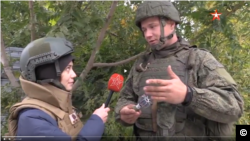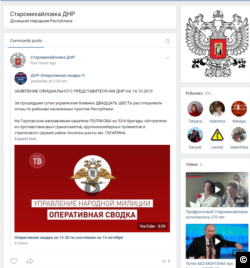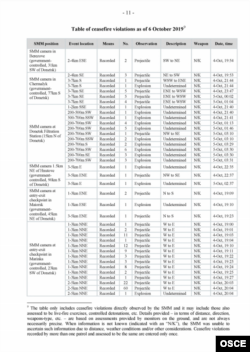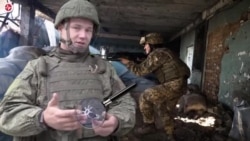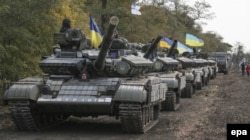On Tuesday, October 8, a representative of the Donestk People’s Militia, Oleg Nikitin said in an interview with the Russian Defense Ministry’s Zvezda TV network that NATO-supplied mortars had been dropped on civilians in eastern Ukraine.
During the interview, Nikitin held up the remains of a mortar shell, claiming it had been attached to a drone and dropped over a residential area.
“This is a 60-millimeter mortar shell. Such [mortars] are produced in NATO countries, including Croatia and Macedonia,” Nikitin said adding that the Soviet Union did not produce such a caliber shell.
TV Zvezda interpreted his comment to mean “those shells are only manufactured in NATO countries.”
Nikitin claimed that local militia men found the shell in the village of Staromikhailovka, 12 miles west of the city of Donetsk, and that it had been attached to a drone and dropped over a civilian-populated area. The report did not say when the alleged drone attack took place.
A VKontakte page for the village posted reports from the Russian media as well as local updates of a shelling and mortar attack that it said began on October 6 and continued on October 7. It said that no casualties had been reported.
The Organization for Security and Cooperation in Europe Special Monitoring Mission to Ukraine daily update for October 6-7 did not report an attack on or around the village of Staromikhailovka.
Nikitin said such shells come under the Minsk agreement, which he claimed limits mortars to “82 mm.”
He also claimed that Ukrainian forces are using mortars of this caliber as part of a loophole to skirt Kyiv’s Minsk obligations and “continue shelling,” particularly targeting civilian populations.
Several aspects of this report are questionable.
Polygraph.info video fact check by Nik Yarst.
While Nikitin was correct to say that 60mm mortars were not manufactured in the Soviet Union, TV Zvezda was wrong to report that those shells are only manufactured in NATO countries.
"60 mm mortars and the projectiles for such are produced in a range of countries around the world, including numerous non-NATO countries,” N.R. Jenzen-Jones, director of Armament Research Services (ARES), a specialist technical intelligence consultancy, told Polygraph.info. “Many Central and Eastern European states have produced mortars and/or projectiles in this caliber, as have China, Israel, South Africa, and many other countries.”
Another example is the 60mm M57 Mortar, which is produced by the Serbian firm PPT Namenska. Serbia is also not a NATO member.
More importantly, Ukraine itself manufacturers a mortar of this caliber.
Kyiv-based Zavod Mayak developed a 60mm M60 Camertone mortar system specifically to meet the needs of Ukrainian armed forces in the Donbas conflict, having first put it on display in 2016.
According to the Ukrainian Defense Review (UDR), the mortar system is intended to be “fired against enemy personnel and vehicles sheltered in trenches and behind shields.”
UDR reports the M60 Camertone mortar system was formally accepted for use by Special Operations Forces in December 2017, and later tested in the Donbas conflict area.
That report specifically states the 60mm mortar is an effective defense against Russia-backed insurgents engaged in offensive actions in defiance of the Minsk accords.
As for the Minsk Accords, intended to halt hostilities in the Donbas region, Nikitin’s assertion that the protocol limits mortars to 82 mm is incorrect.
In fact, the agreement actually calls for both sides to pull back all artillery under 100mm caliber a minimum of 31 miles from the so-called line of contact, in order to create a safety or buffer zone.
With only fragments of a mortar in hand, Nikitin provided neither evidence that the shell was produced in a NATO country nor that it was used to target civilians in eastern Ukraine.
Jenzen-Jones said he could not conclusively identify the origin of the mortar, but added there might be “markings on the remnant—or identifying physical characteristics—that are not visible in the video."
However, Nikitin was vague concerning the place of manufacture, specifically noting NATO countries, “including Croatia and Macedonia,” without identifying which one.
There would be nothing inherently illicit about Ukraine possessing mortars made by NATO countries, as they are a standard artillery weapon used by militaries all over the world. Likewise, there is no “loophole” in a country using weapons that fall within the proscribed limits of the Minsk Protocol.
Polygraph.info therefore finds his statements to be misleading.




